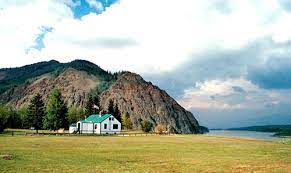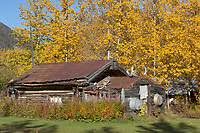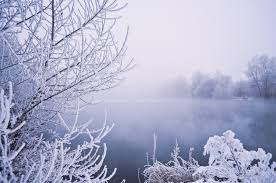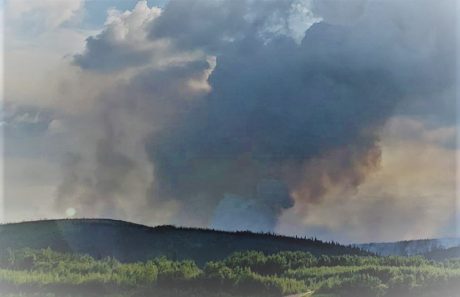Freezer-burned: Tales of Interior Alaska
Posted July 5, 2021 at 5:00 am by Hayley Day
The Allure of Gold, Part 2
“Freezer-Burned: Tales of Interior Alaska” is a regular column on the San Juan Update written by Steve Ulvi.
 When Pappy Scoggins parked his modified school bus at the old boat landing in Eagle, Alaska he never imagined the grousing by locals accustomed to using that area to load boats, or camp overnight if need be. He soon learned that river-trippers coming down the Yukon River generally pulled in there as the last chance to stop in the little historic town before being swept around the towering Eagle Bluff. The next river town and road terminus were 150 miles downriver at Circle City.
When Pappy Scoggins parked his modified school bus at the old boat landing in Eagle, Alaska he never imagined the grousing by locals accustomed to using that area to load boats, or camp overnight if need be. He soon learned that river-trippers coming down the Yukon River generally pulled in there as the last chance to stop in the little historic town before being swept around the towering Eagle Bluff. The next river town and road terminus were 150 miles downriver at Circle City.
The unimproved vehicle turnaround and boat eddy was considered a public-commons with more convenient foot access to town than the big landing a half mile upriver. The town sawmill, leaving few hints as to its existence, had been right there on the higher ground by 1900. Somebody now owned the land down to the mean high-water mark of the river (the State of Alaska owned below that) but whoever it was, they didn’t care about local use. But few folks found it acceptable to have it taken over like a “Hillbilly Holler”. Definitely not a good place to tear a school bus apart in a half-assed, Rube Goldberg attempt to build a barge.
Distant cousins, Erline and Sturgill Scoggins, knew nothing of their Idaho hitch-hikers being wanted by the law. Their unintended big splash in town was further tainted when the nefarious brothers managed to party with the town drunkard only to steal his truck while he was passed out and get while the gettin’ was good. “Wanted bank robbers, no less!” made for heady grist in the rumor mill. But it is fair to say that most folks were glad that the town’s friendly inebriate now had to fall back to riding his bicycle; every bit as unsteady, hat pulled down like Gabby Hayes, weaving slowly along the dusty roads, but far less of a danger to others.
The final straw for Pappy, after receiving local guff, was when Dirty Frank lined his canoe from 80 miles downriver, camped close to the bus and stupefied himself by smoking dirt weed and dipping green homebrew from a 5-gallon bucket. All hours of the day. The family prayed for Frank’s redemption. Pappy considered offering to baptize him if he would accept the Lord. As others could attest, the family had really only seen the tip of the iceberg of Frank’s debauchery and their concern for his mortal soul would not make a whit of difference. A nose-plugged dunk in the silty river was how he occasionally bathed every summer anyway.
 Sturgill trudged back from the post office one afternoon, frustrated that unemployment checks had not arrived, to find that Dirty Frank had rescued some folks on a log raft. It had sweeps and wall tents like a gold rush replica. The worst possible mode of river travel. The raft had been inexorably sliding by, just off shore, sweeps thrashing. The rafters were in a frenzied dance to land before spinning around the bluff, missing town altogether. Worse yet, if they couldn’t stop, they would be powerless to avoid bashing the raft into the solid buttress of the looming Eagle Bluff that was shedding 200,000 cubic feet per second of boiling current, likely tearing the raft apart.
Sturgill trudged back from the post office one afternoon, frustrated that unemployment checks had not arrived, to find that Dirty Frank had rescued some folks on a log raft. It had sweeps and wall tents like a gold rush replica. The worst possible mode of river travel. The raft had been inexorably sliding by, just off shore, sweeps thrashing. The rafters were in a frenzied dance to land before spinning around the bluff, missing town altogether. Worse yet, if they couldn’t stop, they would be powerless to avoid bashing the raft into the solid buttress of the looming Eagle Bluff that was shedding 200,000 cubic feet per second of boiling current, likely tearing the raft apart.
A tanned, shirtless guy hollered at a resting, bleary-eyed Frank and flung some loops of heavy rope, imploring him “hurry up, tie it off. Somewhere! Anywhere”! Despite his foggy state, Frank realized that the immutable laws of physics, more specifically mass (4 or 5 tons of sodden logs) and velocity (8 mph current) were mounting exponentially, moment by moment. No big trees or boulders close by the shore. All he could think of in wanting to be a hero for the worried, scantily clad gals on the raft, was to tie off on the nearby bus bumper and stand back. (The bus bumper had been solidly welded to the frame of the bus by the Canadian road crew that inadvertently yanked it off on the Al-Can Highway back in British Columbia).
Stopped in his tracks, Sturgill could hardly believe his eyes as he took in the scene. The raft was at the shore, a heavy rope taut to his bus bumper at the very edge of the water with 25 feet of brake-locked tire furrows leading back to where it used to sit. It didn’t help any that Dirty Frank was partying with the rafters, loudly entertaining them with tales of his escapades. Surely, he wasn’t describing the time he was caught stealing booze from the fall camp of some burly Anchorage moose hunters and roughly tied to a tree for a few days, while they angrily discussed his fate. Frank did have a passing resemblance to Tolkien’s Gollum.
Frank’s lack of basic personal hygiene was detectable even by a blind person with a head cold. His old Levi’s were more dirt and fish slime than cotton. Like anyone, Frank relished some treats during his rare visits. He was eating mayonnaise from a pint jar leaving telltale white globs in his wispy mustache. He offered to share his treat but was probably not winning any points in his thinly-veiled attempt to attract a woman (maybe both!) into joining him for a long cold winter in a tiny cabin, many miles from anyone.
Soon after the near disaster, one of the church-going families took pity on Erline and the kids living in the cramped bus without plumbing or water by proudly stepping up to offer to rent them a rotting old cabin without plumbing or water. They praised themselves for demonstrating brotherly love toward the funny talking, blacker sheep among the highly diverse Christian flock. “The Lord works in mysterious ways, yes he does”. But given the many unrepentant sinners on the river and around town, the fundamentalists were keen to invite the Scoggins’ into their fold. They had a similarly helpful, but clearly patriarchal, attitude toward the native Han people out the road in Eagle Village who had Episcopalian traditions.
After some pestering by Erline, Sturgill signed up as an emergency firefighter with the Eagle #2 fire crew. He somehow passed the step test despite his coal powdered lungs and pinkish spittle in his hankie. But that was not surprising, for each year locals so badly hung-over after a week-long ‘toot’ they could hardly form a thought, also passed the test administered by accommodating personnel from the Alaska Fire Service.
By mid-July, the long hot days of summer often had a set-your-watch-by-it predictability: fine clear cool mornings, rising temperatures and puffy clouds building cumulonimbus energy that coalesced into a dark wall that spat bolts of lightning to spawn dozens of wildfires. The 2 O’clock Express. Being on the river in a metal boat was nervy on these afternoons: strong downdraft winds, pelting hail, heavy rain and forked lightning. Anyone on the water had to run for shore, pole the boat out to lessen a drubbing onshore, and duck under a tarp to let the dark monster pass. Uncareful kayakers or canoeists had their boats tumble down the shore like dry leaves. Once in a while, a person would see strikes on a ridge, then tendrils of smoke that could be nourished by wind and grow to alter huge swaths of the boreal forest.
Eagle #1 had been called out west on a complex fire threatening a village, so an enterprising local guy on the second crew motored upriver a few miles late one evening to ignite a blaze on a steep vegetated slope. Surprisingly, the blaze made the top of the ridge to flame up in the black spruce the next day and Alaska Fire Service went against their own clear policy against rewarding suspected arson to call up the local Eagle #2 crew to snuff it out.
Sturgill had never imagined flying in a helicopter. He had never been on a fire crew, even in the mines. He had never cooked much over fires or eaten with a crew of 15 others, most of whom were Native Alaskans who were a mystery to him. For tired, dirty people most of the crew were friendly as everyone was stoked to be making good wages with lots of work hours. Some tallied estimated wages every night with sharpened pencils and dreams of a new snowmachine, outboard motor or winter food for the family.
Sleeping “hootches” were constructed by individual firefighters from black plastic sheeting and white cord. The only real privacy one could find. A young woman kindly showed him how to improve his slumping shelter. A plague of skeets and gnats, dawn and dusk. 12 to 14 hours a day hiking, cutting line and hot spotting with backpack “piss bags” refilled from a large portable pool that was filled by the chopper dipping from the river below. Squawking radios. Latrines. Other crews arriving.
One evening, enjoying a dinner of old canned military field rations, someone mentioned a place called ‘Johnnys Village’ along the river bank, near town, that the University said was several thousand years old. Sturgill wasn’t sure he had heard right. Some of these folks talked funny. He couldn’t get his mind around their relatives living right here so long ago. He knew that Indians lived in the Appalachian Mountains way back too, but they were run off by his own northern European relatives willing to dig coal underground and populate every hollow, to live in material poverty, to bring forth civilization.
In camp Sturgill was struggling, mind and body, but hid it well for the first couple of days. Endless days. The exertion, heat and smoke kindled a racking cough and hawking spit all night long. Soon his hootch had no immediate neighbors. After a grueling day five, his squad boss, Sonny Woods from Eagle, took him aside and asked about his respiratory issues. Sturgill hemmed and hawed because he planned to tough it out to make money. But this wasn’t Sonny’s first rodeo, so he persisted, closely adhering to his responsibilities. He had already conferred with the crew boss about a few squad concerns. The racking cough of Sturgill Scoggins was at the top of that list along with a couple that noisily made whoopy about every night.
Then he noticed Sturgill’s crimson spit rag, shook his head and sighed. “Damn it all. Pack your gear, Sturgill. Be ready to board the supply chopper in a couple of hours”. He would be required to see the Village Health Aides who would talk about a diagnosis with physicians in Fairbanks before he could possibly be cleared to rejoin them. They both knew that wasn’t going to happen. “You’ll be off the clock after you check out with Jerry at the Fire Station in Eagle. You’ll get a check in a couple weeks. Good luck.”
As the long summer days flowed into the wetter weeks of August, dreams of gold mining and bettering their lives slipped away for the Scoggins clan. Even Sturgill, the originator and proselytizer of that dream, knew that it was evaporating like a snowbank in summer. He had gradually been forced to sell or trade most of their camping and mining equipment for expensive store-bought food and cabin rent. Recognizing their plight, helpful locals regularly dropped by the cabin to make absurd low ball offers on various pieces of equipment and tools for later resale.
The oldest Scoggins kids, Eartha and Jacob, were employed by the store/restaurant/laundromat/speak-easy/heavy equipment/gas station/septic tank pumping/motel rooms/repair shop/school bus contract magnate. They were paid less than minimum wage along with others slaving to keep his ramshackle empire functioning. If anyone started a small business or even talked about it, he stole the idea and crushed them to preserve his parasitic monopoly.
Soon after her arrival, Erline began earning money by cleaning cabins. She became known for her work ethic and easy-going manner. Older women, especially those who were single, soon gossiped about Erline spending so much time at George Buckles’ little house that “she could have scrubbed off all the wall paint and linoleum by now, you know”. George was a kindly, retired miner who had been born around Eagle and never married. When asked about the latter he often replied “yep, just lucky I guess”.
The truth was that Erline and George enjoyed one another’s company but their platonic relationship was based upon mutual respect and a trade; she would patiently teach him to play a couple of fiddle tunes and he would regale her with stories from his six decades of life in Eagle. For a couple of hours every few days, she could forget about the incessant demands of an ailing Sturgill and the footloose kids. Erline fretted most about Eartha in the largely dysfunctional social scene in a community of 120 at the end of the road. She was their only daughter; mid-teens, eyes open, highly perceptive with a chance to be the first from either branch of her Appalachian family to get past high school.
In Eagle, smoke was coming up the river and it was sweltering; a subarctic heat wave anyway with temperatures about 90F but with days nearly 20 hours long. Fine river silt hung in the air long after vehicle passage in town; most outsiders respected the 15 mph signs but a few ‘mouth-breathers’ and kids on 4-wheelers crop-dusted the place. The two younger Scoggins boys scuffed around town bored after unsuccessful fishing at Mission Creek and wading in the Yukon to cool down. The Henklehoffer brothers told them about a place they could watch a naked woman and see EVERYTHING! Off they went.
There were two gardeners in Eagle who shed their clothes to hoe and water in hot weather. Old Charlie Grunderstrom, alabaster white and thin as a rake could be easily seen from the busy boat landing area if you got the right angle. He was old enough to be beyond caring. Oddly, many buttoned-up older women who didn’t use boats managed to see him and shared the revolting experience in some detail.
Up the hill where the Taylor Highway dropped into town, a woman in her 40s, tanned as only a serious nudist can be, tended a huge garden partially screened by roadside willows. Young fellows hid and watched feeling an odd thrill. Most local men drove by slowly, just in case. One appreciative guy whistled and got the finger. I suspect that from the elevated seat of an RV rolling slowly into town, aged husbands and wives, tired of the drive and dust, were thrilled to finally see the leafy town and the big river. More than one male driver probably glanced left to spy the healthy young woman bent over weeding carrots, but wisely kept it to himself.
Life goes on while dreams fade and experience unleashes new possibilities. Erline knew that Eagle was no place to settle in after the road closed for a daunting, frigid winter. Her family, and everyone in it, was changing as fast as the subarctic seasons. And not for the better. After weeks of discontent, she tearfully told Sturgill that she and the kids would be packing up and heading to Fairbanks in the back of a returning supply truck. Jacob, nearly 15, wanted to stay with his Pappy who had happily agreed to spend the approaching winter caretaking a hunting guide’s cabin way up in the Brooks Range.
Erline made friends and adapted beautifully to the many options in polyglot Fairbanks with the help of social services and the large Baptist church. Her heart soared to hear people talk in tongues again. Eartha and her two brothers enrolled in school. Fairbanks is a college town and Eartha was thrilled.
Winter breaks hard in the Brooks Range, the northernmost major mountain range on earth. The learning curve there is an 11 out of 10. Sturgill was weak and Jacob took on most tasks with vigor as leaves fell. He gut-shot two caribou one morning, eventually found ‘em. The cabin was simply stocked and habitable enough.
 However, they failed to follow instructions about cleaning the stovepipe and created a chuffing stack fire that burned most of the roof structure before they could quench the nightmare. The radio antenna was gone so there was no communication from the outside world at all. While others scattered in the hinterlands of northern Alaska heard Erline’s nightly messages of love and prayers, sent out on the Trapline Chatter program to “Sturgill and Jacob Scoggins on Last Chance Creek”, no one could know of the desperate struggles of the father and son.
However, they failed to follow instructions about cleaning the stovepipe and created a chuffing stack fire that burned most of the roof structure before they could quench the nightmare. The radio antenna was gone so there was no communication from the outside world at all. While others scattered in the hinterlands of northern Alaska heard Erline’s nightly messages of love and prayers, sent out on the Trapline Chatter program to “Sturgill and Jacob Scoggins on Last Chance Creek”, no one could know of the desperate struggles of the father and son.
In December when conditions finally allowed, the guide flew in to land on the frozen lake to check on them. He had seen the cabin, disassembled and covered with snow on his final landing pass. Walking in knee-deep snow he soon saw the wisp of smoke of the dugout. They had dug into the hillside just as the soil was freezing and built a wooden support from cabin wood, like that of coal tunnels Sturgill knew so well. It was covered with dirt with one small window in the door facing north.
The guide was scared stiff as to what he would find. As he approached the door, he faltered by a frozen body wrapped in a tarp next to a small woodpile, then forcing the door open, roused a person fitfully dozing in a pile of clothes and blankets on a musty mattress in the corner. As the guide’s eyes adjusted to the dim earthen cave, Sturgill coughed a jag and rose on his elbow with vacant eyes. Sobbing, he hoarsely whispered, “my son kilt his self a while back”.
You can support the San Juan Update by doing business with our loyal advertisers, and by making a one-time contribution or a recurring donation.
Categories: Freezer Burned











No comments yet. Be the first!
By submitting a comment you grant the San Juan Update a perpetual license to reproduce your words and name/web site in attribution. Inappropriate, irrelevant and contentious comments may not be published at an admin's discretion. Your email is used for verification purposes only, it will never be shared.